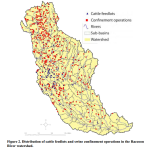To ThePerryNews.com:
Let’s go “light” on Mother Nature.
The U.S. government tells us that we should not drink water with more than 10 mg/L of nitrate. The Des Moines Water Works must somehow get the nitrogen out of the Des Moines and Raccoon River water before sending it to customers.
Over the past four months, the nitrogen levels have been higher than 10 mg/L in the Raccoon River. This has not happened before at this time of year. The DM water works is proposing to sue three counties for contributing to unacceptable nitrate levels in the ’Coon.
Our rivers were not always fouled with nitrates. What are the causes of the current problem? In his Feb. 15 letter to the Des Moines Register, Tim Palmer of Truro said he thinks Mother Nature deserves some of the blame for the nitrates in our drinking water.
According to a Des Moines Water Works report written in 2005, the nitrate levels in the Des Moines River averaged less than 1 mg/L before 1910 and this was likely also true for the Raccoon. The Cedar River averaged less than 2 mg/L between 1945 and 1951. A United States Geological Survey report in 2001 stated that nitrate concentrations in the Des Moines River in the 1990s were 75 percent to 100 percent higher than in 1945.
Iowa’s official Nutrient Reduction Strategy states that more than 90 percent of the nitrate in our water is coming from farm fields. The recent unusually high levels could be due in part to high corn prices. It makes economic sense to plant more corn acres, put in more field tile and put on more fertilizer when corn prices are high.
Nitrogen management, whether chemical or hog manure, could be much better. Farmers should be seeking the technical help to use the many tools available to reduce nitrate pollution. We all want the nitrogen in the crops, not in the rivers.
Mr. Palmer of Truro is right when he says we must all work together to solve this problem. A rain event is not responsible for four months of 10mg/L nitrates in the Raccoon. Let’s go light on Mother Nature and figure something out.
Mike Delaney, Raccoon River Watershed Association
Des Moines


















